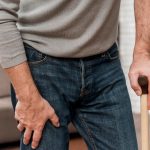If you suffer from knee osteoarthritis, there are a lot of common treatments that don’t work well, and an equally long list of alternative treatments that do.
So today I’m going to make things extremely easy for you.
First, we will take a look at what doesn’t work to ease knee pain. Then, I’ll clearly explain what does.
Acetaminophen is often recommended as a first line of treatment for joint pain. However, numerous studies show that acetaminophen doesn’t work any better than a placebo to relieve pain associated with arthritis of the knee or hip. The effect on pain and disability is so small that it’s not even worthwhile. Plus, this type of pain reliever is the leading cause of acute liver failure in the U.S.
NSAID pain relievers like Aleve (naproxen), Advil (ibuprofen) and Celebrex (celecoxib) are also frequently used as a first line of defense for arthritis pain. However, these medications are known to accelerate the breakdown of joint cartilage and prevent the formation of new cartilage. They can literally speed up the progression of arthritis! Worse, NSAIDs can trigger heart attack, stroke – even cardiac arrest – within just weeks of use.
Corticosteroid injections may help relieve pain for a short while, but like NSAID pain relievers, they can actually worsen your arthritis. They damage bone and cartilage, cause rapid joint destruction, lead to stress fractures and may accelerate the need for joint replacement surgeries.
As a matter of fact, a study published in JAMA treated a group of patients with either corticosteroid injections or saline injections every 12 weeks for two years. At the end of the study, those who received the corticosteroid injections showed significantly greater cartilage volume loss and no significant difference in knee pain!
Think long and hard before deciding on knee surgery. Awhile back a group of patients with arthritic knees took part in an experiment. All of them went into an operating room and had a knee cut open for surgery.
The thing is, some of the surgeries were real, and others were bogus. The surgeons didn’t actually perform the operation on some of the patients… but the patients didn’t know it.
Two years later neither group – those with real surgeries or those with fake ones – reported less pain or better knee function.
More recently, the British Medical Journal released a clinical practices guideline with a strong recommendation against knee surgery in nearly all patients with degenerative knee disease. They found that knee surgery was no better than exercise therapy when it came to long term pain and function.
However, this doesn’t mean you’re out of options. Let’s take a look at some real solutions for those stiff and aching knees.
5 Nutrients to Shut Down Knee Pain
Osteoarthritis is generally caused by a breakdown in your joint cartilage. This can happen for many different reasons: being overweight, a joint injury, or simply stress on the joints from a specific job or sport.
Here’s the problem: Most of the cartilage in your joints is comprised of collagen. As it breaks down and becomes exposed, your immune response goes into overdrive. It’s this inflammatory reaction that produces pain. It’s also this inflammatory reaction that increases the amount of cartilage being destroyed.
The idea, then, is to shut down this inflammatory response. And there are several nutrients that can do just that.
A favorite of mine is green lipped mussel extract. It’s high in something called “furan” fatty acids. These fatty acids scavenge damaging free radicals. Just 150 mg. daily can reduce joint tenderness, morning stiffness and improve pain levels.
I also like an enzyme found in pineapple, called bromelain. It helps keep certain inflammatory substances (bradykinin and fibrinogen) from building up around your joints and triggering inflammation. Taking 200 mg daily can reduce pain, stiffness and swelling.
Another good choice is chicken cartilage extract. It contains type II collagen. This is the type of collagen that’s needed for the synthesis and repair of connective tissue. Taking 400 mg daily may provide anti-inflammatory activity and improve joint flexibility.
The most exciting, however, is curcumin. In fact, I’m so impressed by this nutrient that I’m right in the middle of creating my own formula.
In particular, curcumin shuts down inflammation by blocking enzymes that produce pain. In the majority of cases, people who take curcumin are able to stop taking dangerous anti-inflammatory drugs within just weeks. In fact, it’s proven to be just as effective as ibuprofen when it comes to decreasing pain and improving function.
Look for a formula that contains 95% curcuminoids and at least 5 mg. of bioperine (a black pepper extract) to help boost absorption. Take 500-1,000 mg. twice a day to shut down inflammation
You can also find over-the-counter hyaluronic acid supplements, which can help cushion joints, protect your cartilage and ease joint movement.
The One Thing You Should do Every Day
I have one more tip for you.
Believe it or not, the best way to beat the pain and stiffness of arthritic knees is to keep moving. However, when your knees are aching this can be a difficult challenge. That’s why I often recommend aquatic exercises.
All you need is access to a swimming pool, lake or ocean. The water keeps you buoyant, which reduces the impact on your joints. So you can jog in place, perform jumping jacks or just swim without putting any wear and tear on your joints.
This low-impact type of exercise is easy to do. Better yet, it can strengthen your joints while significantly relieving the aches and pains associated with arthritis.
SOURCES:
Leopoldino AO, Machado GC, Ferreira PH, Pinheiro MB, Day R, McLachlan AJ, Hunter DJ, Ferreira ML. Paracetamol versus placebo for knee and hip osteoarthritis. Cochrane Database Syst Rev. 2019 Feb 25;2(2):CD013273.
Simic M, Harmer A, van der Esch M, Bennell K, Ferriera P, March L, Fransen M, Day R. Do Non-Steroidal Anti-Inflammatory Drugs Cause Osteoarthritis Progression, A Systematic Review and Meta Analysis. Osteoarthritis and Cartilage. 2019; 27:S92eS516.
FDA Drug Safety Communication: FDA strengthens warning that non-aspirin nonsteroidal anti-inflammatory drugs (NSAIDs) can cause heart attacks or strokes. Safety Announcement. U.S. Food and Drug Administration. July 2015.
Kompel AJ, Roemer FW, Murakami AM, Diaz LE, Crema MD, Guermazi A. Intra-articular Corticosteroid Injections in the Hip and Knee: Perhaps Not as Safe as We Thought? Radiology. 2019 Dec;293(3):656-663.
McAlindon TE, LaValley MP, Harvey WF, Price LL, Driban JB, Zhang M, Ward RJ. Effect of Intra-articular Triamcinolone vs Saline on Knee Cartilage Volume and Pain in Patients With Knee Osteoarthritis: A Randomized Clinical Trial. JAMA. 2017 May 16;317(19):1967-1975.
Moseley JB, O’Malley K, Petersen NJ, Menke TJ, Brody BA, Kuykendall DH, Hollingsworth JC, Ashton CM, Wray NP. A controlled trial of arthroscopic surgery for osteoarthritis of the knee. N Engl J Med. 2002 Jul 11;347(2):81-8.
Siemieniuk RAC, Harris IA, Agoritsas T, Poolman RW, Brignardello-Petersen R, Van de Velde S, Buchbinder R, Englund M, Lytvyn L, Quinlan C, Helsingen L, Knutsen G, Olsen NR, Macdonald H, Hailey L, Wilson HM, Lydiatt A, Kristiansen A. Arthroscopic surgery for degenerative knee arthritis and meniscal tears: a clinical practice guideline. BMJ. 2017 May 10;357:j1982.
Abshirini M, Coad J, Wolber FM, von Hurst P, Miller MR, Tian HS, Kruger MC. Green-lipped (greenshell™) mussel (Perna canaliculus) extract supplementation in treatment of osteoarthritis: a systematic review. Inflammopharmacology. 2021 Aug;29(4):925-938.
Crowley DC, Lau FC, Sharma P, Evans M, Guthrie N, Bagchi M, Bagchi D, Dey DK, Raychaudhuri SP. Safety and efficacy of undenatured type II collagen in the treatment of osteoarthritis of the knee: a clinical trial. Int J Med Sci. 2009 Oct 9;6(6):312-21.
Lugo JP, Saiyed ZM, Lane NE. Efficacy and tolerability of an undenatured type II collagen supplement in modulating knee osteoarthritis symptoms: a multicenter randomized, double-blind, placebo-controlled study. Nutr J. 2016 Jan 29;15:14.
Appelboom T, Maes N, Albert A. A new curcuma extract (flexofytol®) in osteoarthritis: results from a belgian real-life experience. Open Rheumatol J. 2014 Oct 17;8:77-81.
Kuptniratsaikul V, Dajpratham P, Taechaarpornkul W, Buntragulpoontawee M, Lukkanapichonchut P, Chootip C, Saengsuwan J, Tantayakom K, Laongpech S. Efficacy and safety of Curcuma domestica extracts compared with ibuprofen in patients with knee osteoarthritis: a multicenter study. Clin Interv Aging. 2014 Mar 20;9:451-8.
Oe M, Tashiro T, Yoshida H, Nishiyama H, Masuda Y, Maruyama K, Koikeda T, Maruya R, Fukui N. Oral hyaluronan relieves knee pain: a review. Nutr J. 2016 Jan 27;15:11.



